Adam's Heart Valve Surgery Blog – Page 61
Fantastic Video: Dr. Gaudiani Discusses Surgical Outcomes (Part I)
By Adam Pick on September 10, 2009
Dr. Vince Gaudiani has provided us with several insightful videos in the past. As you might recall, we recently featured Dr. Gaudiani’s two-part video series about heart valve surgery. Given Dr. Gaudiani’s 25-year career as a cardiac surgeon, this video was applauded by our patient and caregiver community.
Yesterday, I learned from Dr. Vince Gaudiani that he has created a new video titled, “How To Think About Surgical Outcomes?” Considering our ongoing discussion about (i) how to manage patient expectations and (ii) how to prepare for surgery, I found this video very, very, very interesting.
Above, you will find the first part of the video. In the next few days, I will post the second part. Simply press the play button and make sure the volume on your computer is on.
Thanks to Dr. Gaudiani for taking the time to share his unique experiences, thoughts and data. It should be no surprise that if you visit our Heart Surgeon Database, Dr. Gaudiani has received several glowing reviews from our patient community. (Just type “Gaudiani” in the last name search field.)
Keep on tickin!
Adam
“Dizzy After Heart Valve Surgery?” Asks Rick
Written By: Adam Pick, Patient Advocate, Author & Website Founder
Page Last Updated: June 24, 2025
I just received a very interesting question from Rick about dizziness after heart valve surgery.
Rick writes, “Adam – I had mitral valve repair surgery. Two weeks after surgery I am home and walking four times per day around our neighborhood. Everything feels good except when I first stand up from a sitting position. I get dizzy even when I stand up slowly. Do other patients experience this? Thanks, Rick”

To answer Rick’s question, I can share that I too had bouts of dizziness after heart valve replacement surgery. The dizzy spells were very similar to how Rick described it… When standing up, I would become slightly off-balance for one or two seconds. To learn more about dizziness after open heart surgery, I did some research. According to MedHelp, “Dizziness is not a common post-operative problem in patients who have had heart valve replacements, so this problem may be unrelated to the valve surgery.”
That said, The Society of Thoracic Surgeons (STS) suggests that “being dizzy” after heart surgery may be related to medication. The STS notes that medicines used in the hospital can cause several side effects. The STS then lists a series of side effects (shown below) which explicitly includes “dizzy or lightheaded when standing”:
- Excessive nausea, diarrhea, constipation, or stomach pain
- Vomiting
- Dizzy or lightheaded when standing
- Confusion
- Tingling in hands and feet
- Extremely slow or fast pulse
- Skin rash
- Unusual bruising or bleeding
If you are reading this and you already had heart valve surgery, I’m curious… Did you experience any issues with dizziness following heart valve surgery? Scroll down to leave a comment and you can also read over 250 patient comments.
Related Link:
Keep on tickin!
Adam
Trivia Time: How Many People Are Diagnosed With Heart Valve Disease Annually?
By Adam Pick on September 9, 2009
Okay. It’s time for some good ole’ heart valve trivia.
The question is, “How many people are diagnosed with heart valve disease each year in the United States?”
a. 300,000 people
b. 500,000 people
c. 3,000,000 people
d. 5,000,000 people
e. 30,000,000 people
According to a recent, population-based study, published in The Lancet Online, about 5 million Americans learn they have heart valve disease each year.
That is a lot of people, right?
For those of you who were recently diagnosed with a valvular disorder (e.g. aortic stenosis and mitral valve regurgitation), this is one more piece of information intended to comfort you… You are not alone. Trust me, you are not alone.
Myself and the patients and caregivers who visit this site are here to help!
Keep on tickin!
Adam
In Arizona… Bruce Friedman, 76, Praises Dr. Jack Copeland After Mitral Valve Repair
By Adam Pick on September 8, 2009
There is nothing better than clicking my inbox and reading a patient success story from one of my readers! Thanks Bruce!
Hi Adam,
Just a note to give you a fast update.
Prior to my mitral valve repair on the 17th of August, we did a lot of endless research – including online information from The Cleveland Clinic, a few New York Hospitals, and, we read your book and subscribed to your blog.
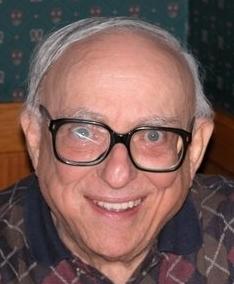
Bruce Friedman – Heart Valve Repair Patient
Top Heart Valve Manufacturing Brands
Written By: Adam Pick, Patient Advocate, Author & Website Founder
Page Last Updated: June 7, 2025
A few years back, Research and Markets published their “Top 25 Manufacturers of Heart Valve Repair And Heart Valve Replacement Devices”.
Given my ongoing interest in this market, I was intrigued by the vast assortment of company names on this list. Some of these brands were new to me. And, given the ongoing consolidation of this industry, some of the brands referenced were very familiar.
Personally, I find the power of brands to be fascinating. In business school, I attended many classes that focused on strategic brand management and its impact upon customers, the competition and success metrics. For example, I am always amazed when I review a valuation analysis of the world’s number one brand, Coca Cola. Did you know, in 2024, the Coke brand was valued at over $98.7 billion dollars?

What Is Your “Best Piece Of Advice” For Future Patients?
By Adam Pick on September 8, 2009
Hey everybody,
I could really use your help… I’m just finishing up the 2010 revision to my book, The Patient’s Guide To Heart Valve Surgery.
As many of you know, one of the current chapters in the book is titled “The Best Piece Of Advice”. In this chapter, I feature thoughtful comments, tips, tactics, tricks and strategies from many former heart valve surgery patients.
Needless to say, it’s a great chapter with some valuable ideas. That said, I wanted to add some more quotes from those who have already had heart valve repair and heart valve replacement surgery.
So… What is your “Best Piece Of Advice” for future patients and caregivers? To answer that question, simply below to leave a comment. (Or, you can scroll down to read 15+ responses from recent patients and caregivers.)
In advance, thanks for taking the time to help out!!! Who knows… Maybe your ideas will be featured in the new edition of the book? 🙂
Keep on tickin!
Adam
“What Happens During A Transesophageal Echocardiogram?” Asks Sophie
Written By: Adam Pick, Patient Advocate, Author & Website Founder
Page Last Updated: July 16, 2025
I just received a great, follow-up question about medical tests used to diagnose heart valve disease from Sophie.
Sophie writes, “Adam – Thanks for the recent blog about cardiac MRIs and echocardiograms. Unfortunately, my aortic regurgitation continues to become more severe. It looks like I’ll need surgery soon. To better diagnose it, I’ve been told I may need a transesophageal echocardiogram. Can you tell me what happens during a TEE? Is it painful? Thanks, Sophie”
To help Sophie better understand what happens during a transesophageal echocardiogram, I was super lucky to find an educational video that details this medical examination used to help diagnose heart valve disease.
If you have never heard the term before, a transesophageal echo uses an ultrasound transducer that is positioned on an endoscope and guided down the patient’s throat into the esophagus (the “food pipe” leading from the mouth into the stomach). The TEE test provides a close look at the heart’s valves and chambers, without interference from the ribs or lungs. TEE is often used when the results from standard echo tests are not sufficient, or when your doctor wants a closer look at your heart, according to the Cleveland Clinic.
Related Links:
- Echocardiograms Use for Heart Valve Disease Diagnosis
- Breaking Research: 4D MRI Flow for Heart Valve Patients
I hope that helps Sophie (and perhaps you) learn a little more about transesophageal echocardiograms.
Keep on tickin!
Adam
“Sensitive Keloid Scars? Sternal Wire Bumps?” Asks Josh
Written By: Adam Pick, Patient Advocate, Author & Website Founder
Page Last Updated: August 1, 2025
Josh has an interesting set of questions regarding keloid scars and sternal wires.
As you can read below, Josh is specifically looking for help from our blog readers. Here is what Josh writes:
Hey Adam-
Things are going great 5 months after my aortic valve replacement and ascending aortic graft. Most of the unpleasant sensations have subsided to a very manageable level. However, I do have an issue that I wanted to ask you and the blog members about…
I have two problem areas on my incision site that I saw my surgeon about today. First, the bottom of my scar has a fairly large raised keloid (shown below) which is very sensitive to the touch.
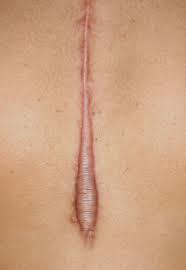
Second, the top of my scar has a prominent bump that turns out to be part of the sternal wires that were used to fuse the bone that are sticking out. Most of the time these wires are left in place, but my surgeon said they could do a removal. He further added that if we were going to remove the wires, he’d have a plastic surgeon consult and help with the re-closure of the incision so as to try to avoid the keloid problem again.
Has anyone had any experiences with one or both of these issues? My symptoms are not intolerable, but they are fairly uncomfortable. I’m not looking forward to another surgery, but my understanding is that it’s a fairly simple outpatient procedure. To leave me a comment, please scroll below!
Related Links:
- Incision Bumps: What Should Heart Surgery Patients Know?
- Patient Review: Mederma For Heart Surgery Incision Healing
- Julie Smiling Scar Selfie Goes Viral!
- Rigid Sternum Fixation: A New Approach for Sternal Closure
Thanks and hope all is well,
Josh
“When I Wake Up In The ICU, How Many Tubes Will Be Sticking Out Of Me?” Asks Gwen
Written By: Adam Pick, Patient Advocate, Author & Website Founder
Page Last Updated: May 11, 2025
I just received a fantastic question from Gwen about waking up in the intensive care unit after heart valve surgery.
She writes, “Adam – Thanks so much for all your help. While I’m still anxious, your support has made me feel somewhat ready for my upcoming heart valve operation. I have one more question for you about the intensive care unit. When I wake up from surgery, exactly how many tubes are going to be sticking in/out of me? Keep on tickin! Gwen”
Interestingly enough, this question triggered a very, very, very unique memory for me.
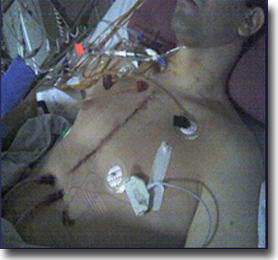
Me (Adam) In The Intensive Care Unit
So you know… My doctors and nurses did not explicitly detail the patient experience within the intensive care unit. Looking back on it, that would have really helped manage my expectation as I came out of general anesthesia.
Video: Extacellular Matrix Used In Heart Valve Repair Surgery By Dr. Gerdisch
By Adam Pick on September 1, 2009
I’m fascinated by the different tools and technologies that help surgeons reconstruct the human heart.
On this point, I just came across an interesting video about the use of extracellular matrix for heart valve repair. In this educational video, Dr. Marc Gerdisch of the St. Francis Heart Center describes extracellular matrix and how it is being used to enhance tissue function in repaired mitral valves.
The Importance Of Support Groups For Heart Surgery Patients?
By Adam Pick on August 27, 2009
Throughout the highs and lows of my heart valve surgery experience, my support group never wavered. Their commitment to me and my recovery was extraordinary considering the challenges (cardiac depression, pain management, Vicodin addiction) I faced.
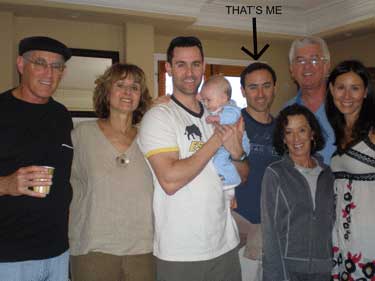
“Ventricular Tachycardia After Aortic Valve Replacement Surgery?” Asks Rita
Written By: Adam Pick, Patient Advocate, Author & Website Founder
Page Last Updated: May 12, 2025
Together, as patients and caregivers, we’ve learned that the human heart can do some odd things after valve repair and valve replacement surgery. In particular, the heart can pound a little louder, the heart can beat a little faster and, if you received a mechanical valve replacement, the heart might make a clicking noise.
That said, I just received an interesting question from Rita specific to very fast heart rates after heart valve surgery.
She writes, “Hi Adam – I have a question. Has anyone had ventricular tachycardia after mitral valve replacement. For ten months, I’ve been telling the doctors about the episodes I’m having. Finally, an episode was caught on EKG while I was on treadmill. They are now going to do an EP study and possible ablation. The doctors are looking for scarring among other things. Plus, the doctors may also look to see if anything is genetic. The VTAC episodes are really scary to say the least. Have any patients on your awesome blog experienced this? I would love to hear the outcome. I had atrial fibrillation after surgery. Now, I am wondering if it was VTAC the whole time? Thanks, Rita”
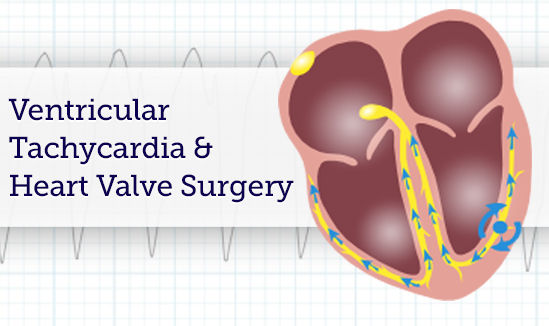
Mark’s Incredible Ride For The Make-A-Wish Foundation
By Adam Pick on August 26, 2009
There really is nothing better than waking up in the morning, turning on the computer, clicking my email inbox and receiving a patient success story from one of my readers.
The story below comes from Mark Hurst in Michigan. As you can read, Mark did not let heart valve surgery inhibit his altruistic bike ride for a Make-A-Wish Foundation charity event. If you’re looking for some inspiration, please continue reading:
Hi, Adam –
I am 41 years old, and (quite suddenly) had aortic valve and aortic root replacement on March 30, 2009.
When I was initially diagnosed with severe congenital aortic dilation and scheduled for near immediate surgery (3 days later), one of the first resources I found was your website. The information on the site really helped me get oriented to and educated about what was happening to me. It also gave me hope that full recovery is very possible.

Mark Hurst – Heart Valve Replacement Patient
“Is Your Heart Valve Surgery Newsletter Really Free?” Asks Amy
By Adam Pick on August 25, 2009
Amy just sent me an interesting question about my newsletter. She writes, “Adam – I’ve been coming to your blog for three months now. In May, I was diagnosed with severe regurgitation from mitral valve prolapse. I’m curious to know, is there a hidden fee if I subscribe to your newsletter? Is it really free? Thanks, Amy”
The answer to Amy’s question is a very, very, very simple… Yes, It’s Free! There is no hidden cost to signing up for my newsletter. I know there are a lot of Internet scams out there, but my free newsletter is definitely not one of them. Maybe that is why several thousand people have signed up!

If you would like to subscribe, simply click the button below. That way you can stay up-to-date on all the latest news, insights, research and opinions from our growing heart valve community. Plus, in the next few weeks, I am going to announce a number of helpful changes to this website that you will not want to miss.
I hope that answers Amy’s question.
Keep on tickin!
Adam
“Did You Get An M.R.I. Before Heart Valve Surgery?” Asks Gregg
Written By: Adam Pick, Patient Advocate, Author & Website Founder
Published: May 9, 2025
Through your stories and my ongoing research, I have learned that properly diagnosing heart valve disease can be tricky. That said, I always encourage patients to get a second opinion prior to any surgical treatment (if possible).
However, Gregg just sent me an interesting question about the use of M.R.I.’s as a diagnostic tool for valvular disorders. [If you have never seen an M.R.I. of the human heart before, please see below… Can you identify the two valves that are opening-and-closing in this image?]
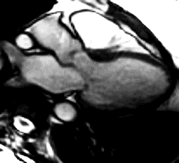
M.R.I. of the Human Heart
“Did Your Enlarged (Dilated) Left Ventricle Return To Normal Size After Surgery?” Asks Sandra
Written By: Adam Pick, Patient Advocate, Author & Website Founder
Page Last Updated: June 7, 2025
I just received a great question from Sandra about heart valve disease, enlarged hearts and valve surgery.
Sandra writes, “Hi Adam, I read that you had an enlarged heart before your surgery. I was wondering if it has returned to normal size since the surgery? I had mitral valve repair due to severe mitral regurgitation and an aneurysm repair in July 2008. I was told that my heart was enlarged and that it may not return to its original size. I exercised quite vigorously before my diagnosis thinking that my shortness of breath was due to being ‘out of shape’. The more short of breath I became, the harder I exercised. Now, I am wondering if this caused the heart to enlarge even more. My echo at 4 months post-op showed the heart still enlarged. I go again in September for another echo and I’m curious to see if it has returned to normal. Thanks, Sandra”
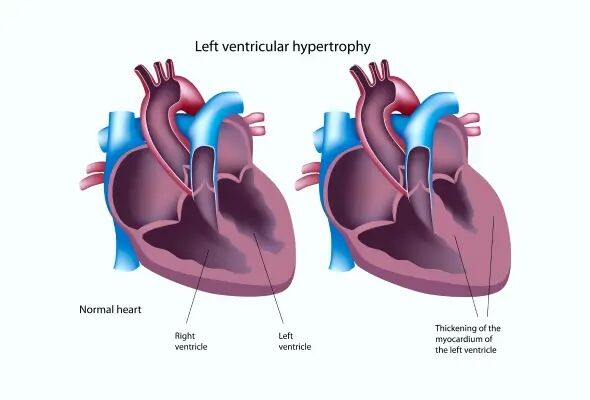
Karate Instructor, John Doss, Recovers After Heart Valve Surgery
By Adam Pick on August 18, 2009
Here’s a great patient success story about John Doss, a 56-year old Karate instructor from Michigan. Doctor Ali Kafi, Chief of Clinical Cardiothoracic Surgery, from Detroit Medical Center, performed the aortic valve replacement.
[video34]wT23obEeVlM[/video34]
During the video, Dr. Ali Kafi references the use of a mini-sternotomy. To give you a visual comparison of a mini-sternotomy incision versus a full sternotomy scar, please consider the pictures below. The first picture shows a patient with a mini-sternotomy.
Ladies… Think Positive For Healthy Hearts!
By Adam Pick on August 18, 2009
Sarah just sent me another interesting story about women, optimistic thinking and heart disease that was recently posted at the Los Angeles Times. Here are the details:
Many studies suggest that people who possess a sunny outlook on life tend to have better health and live longer. Here’s more evidence for the theory. A study by cardiac researchers showed that optimistic women had a lower risk of developing heart disease or dying of any cause compared to pessimistic women.
The study, published today in Circulation: Journal of the American Heart Association, studied 97,253 postmenopausal women ages 50 to 79 from the U.S. Women’s Health Initiative study. The women did not have cancer or heart disease at the start of the study. They completed questionnaires designed to assess their emotional outlook.
Denise Praises Dr. Bleiweis After Eli’s Heart Valve Surgery
By Adam Pick on August 17, 2009
I have the privilege of speaking with caregivers from all over the world.
As many of us know, heart valve surgery can be just as trying on the caregivers as it is on the patients. For this reason, many of their stories are both emotional and inspirational. That said, I thought you might like to read an email from Denise about her son, Eli, and his recent aortic heart valve repair:
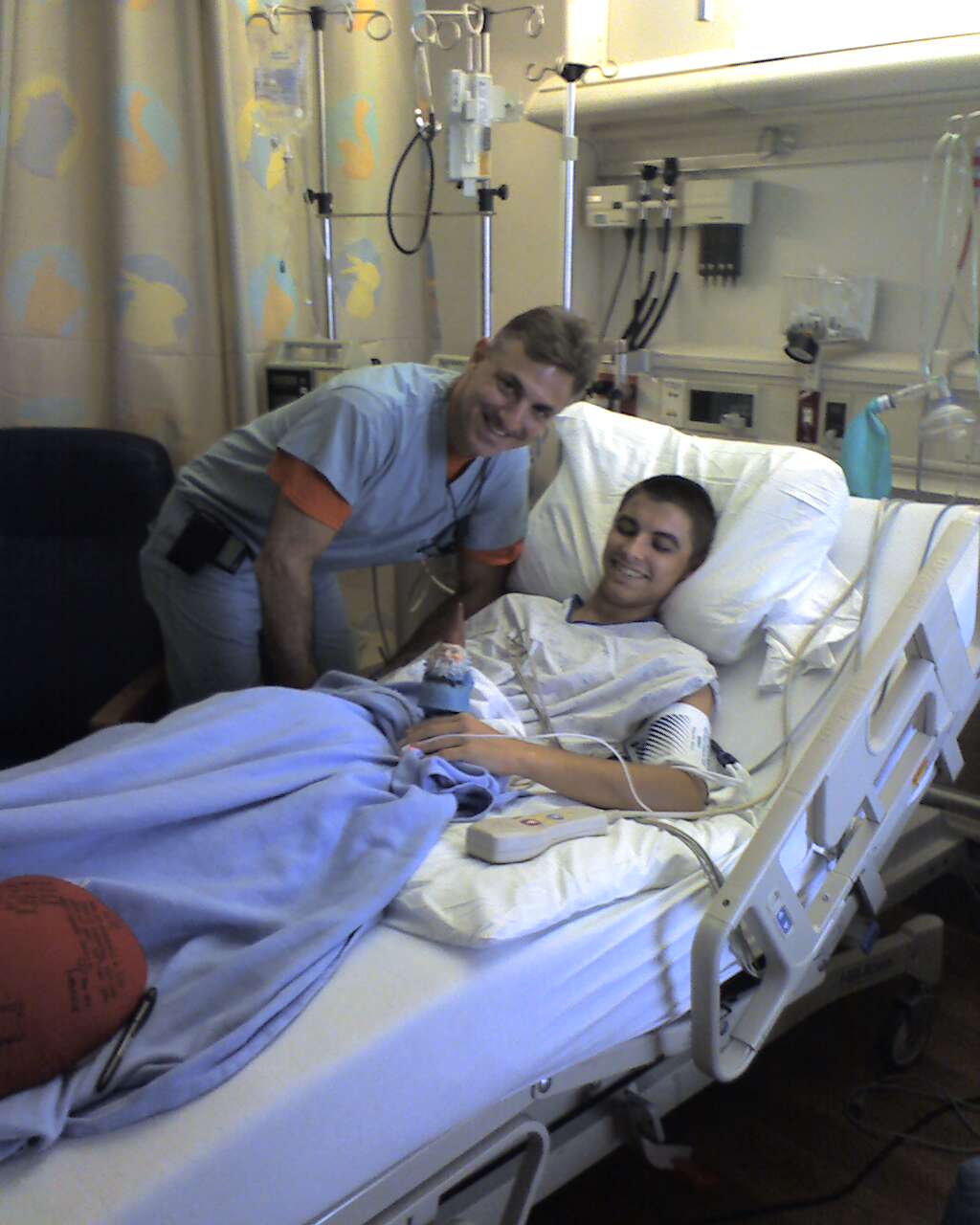
Eli & Dr. Marc Bleiweis
More Data On The MitraClip For Mitral Regurgitation Treatment
By Adam Pick on August 17, 2009
As we have discussed before, most minimally invasive treatments for heart valve disease continue to show encouraging results. Recently, additional results for high-tech devices from Edwards Lifesciences, Medtronic and Evalve have been posted.
Specific to the MitraClip for mitral valve repair, I just saw an announcement which detailed the results of 107 patients for the nonrandomized Everest 1 and 2 studies.
- A full 66% of patients did not require surgery and maintained a mitral regurgitation grade of less than 2 at 12 months, the primary efficacy end point of the study.
- In all, 32 patients needed mitral valve replacement surgery within 3.2 years of receiving the MitraClip. Of these procedures, 84% were successful.
- 9%, had a major adverse event during the follow-up period, including one non-procedure-related death.
- Overall procedural success was 74%, and 64% left hospital with a mitral-regurgitation grade of 1 or less, as opposed to grade 3 or 4 at study entry.
- In all, 32 patients needed mitral-valve surgery within 3.2 years of receiving the MitraClip.
“Surgical options were preserved,” the authors, led by Dr Ted Feldman (Evanston Hospital, IL), write in the August 18, 2009 issue of the Journal of the American College of Cardiology. “The fact that there were no in-cath lab deaths during this procedure in over 100 patients compared with, for example, stent therapy, shows that this is acceptable in terms of safety, all the more so given that this is a brand new intervention,” Feldman told heartwire.
Investigators also highlighted the “steep learning curve” seen in the study, with the first 30 procedures taking over four hours, while the last 30 typically took under three hours.
A randomized trial, comparing percutaneous mitral-valve repair with the MitraClip with surgical valve replacement or repair is ongoing; one-year follow-up will be completed in October, Feldman said. The MitraClip received a CE mark in Europe last year.
Keep on tickin!
Adam






